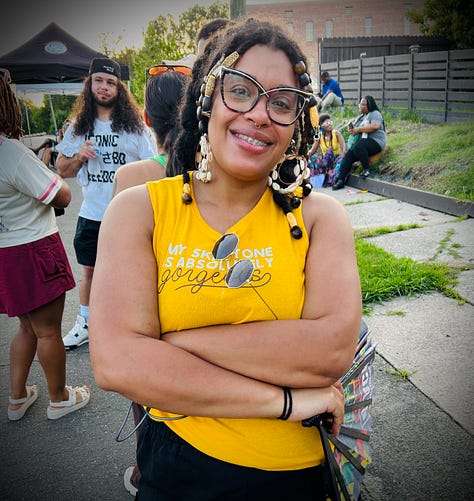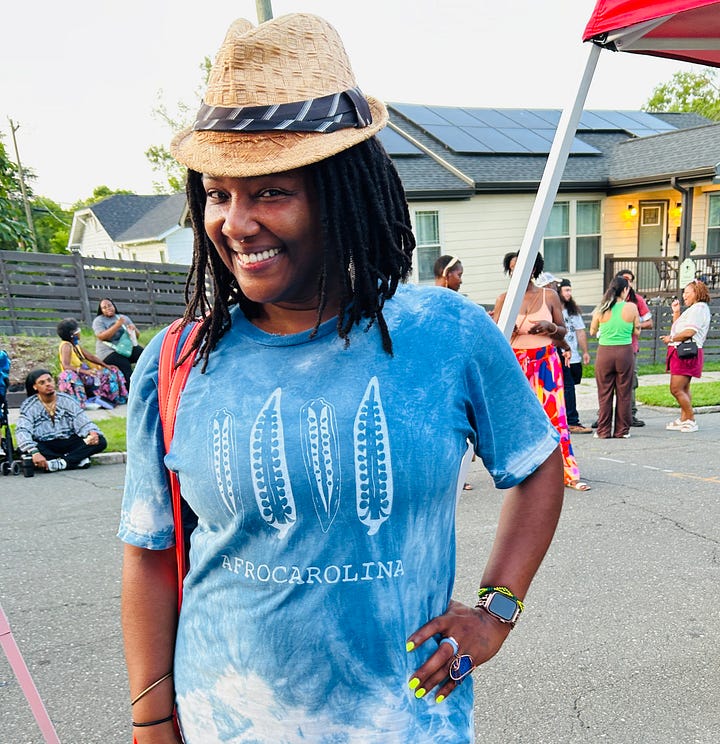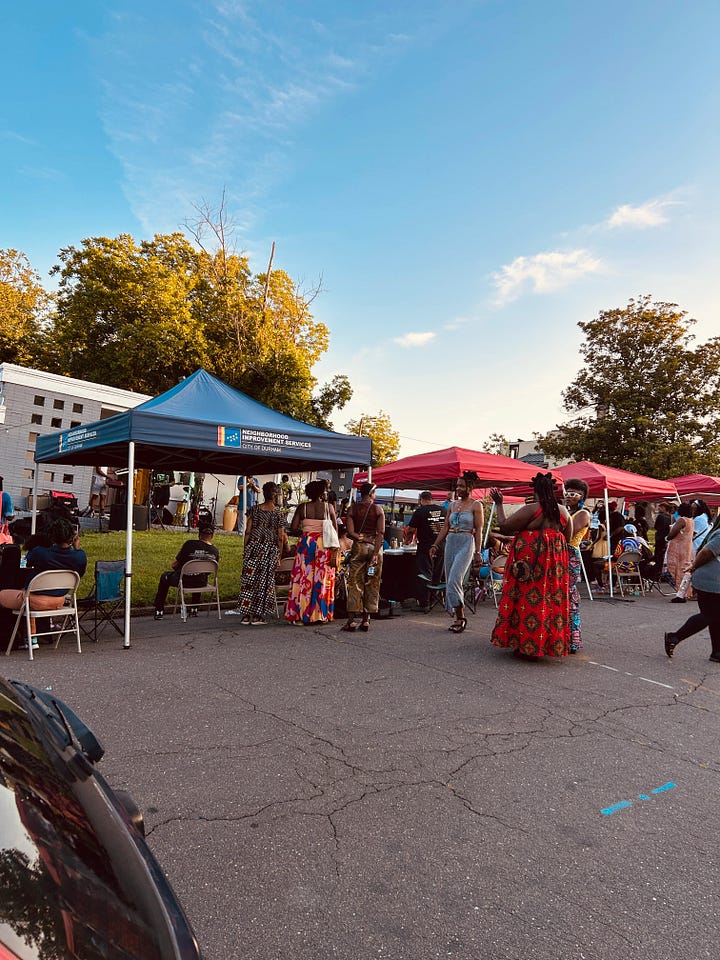AfroCarolina Correspondence #619: On the Function of Juneteenth
Revisiting the Radical Possibilities of Black Freedom Celebrations
I spent this past Juneteenth celebrating my Grandma Ann’s 83rd birthday in Eastern NC. We ate her favorite, Coconut cake, and talked about her frustration surrounding the lack of participation in local politics. I was also nursing a lingering frustration that began last year around this time. Since becoming a federal holiday in 2020, Juneteenth has become a painful reminder of the fact that nothing is safe from the clutches of capitalism in this country- not even Black liberation celebrations.
Last Juneteenth, the only thing that felt right was holding grief ceremony with my ancestors1. This year, despite intentionally not making any plans, I found myself in a whirlwind of Juneteenth festivities that illuminated the radical possibilities that still lie within a holiday I’d written off as a casualty of American consumerism.
Juneteenth Possibilities in Durham, AfroCarolina
The Juneteenth Collective, is a trio of Black women who came together to host a series of Juneteenth celebrations in Black neighborhoods throughout Durham. I had no idea about the collective or the events until the Friday of Juneteenth week when I thought I was headed to the Black Healers Market and found myself at a whole festival with live music, vendors, and even a pop up exhibition by Village of Wisdom, a local Black youth organization.
Right there in Hayti, Durham (pronouced Hay-Tye), outside the Stanford L. Warren Library, there were Black people envisioning liberatory futures for our children, holding meditation sessions, sharing herbal medicine, dancing, laughing, catching up, playing music, and just having a good, healing, Black-ass time2.





Black Music- A Sacred Call & Response across Space and Time
I was struck in particular by the music. There was one band whose set wove together hip hop, neo soul, and funk. Every single person in that band, from the background singers to the base player, was phenomenal. The lyrics were intentionally political in a way that felt both activating and uplifting. They invited elders to come up and talk about what they loved about pre-gentrified Durham- a sort of Black land acknowledgement consecrated with a baseline. The band concluded their set with a gogo song and got into a pocket so deep that made the entire block vibrate
“Sound is a way to occupy space”3
The evening ended with a performance and West African dance session with The Magic of African Rhythm, led by Teli and Mabiniti Shabu. Adorned in African garments, they danced and sang, inviting the Black audience to participate in a ritual both new and familiar. They brought this rhythmic invitation to the Junetheenth celebrations at the North Durham Farmers Market and Bragtown the following day. Each set included an introduction to the African indigenous instruments they were playing, including the kora and balafon.
The kora is a 21 string harp flute made with calabash gourd and cowhide. It’s most associated with the Mande people of Mali and was likely created around the 18th century, but earlier iterations of the kora date back to the 13th century. The balafon is one of the oldest known West African indigenous instruments dating back to 12th century Mali. It’s constructed with calabash gourd, cowhide, and hardwood and is played like a large xylophone with wooden mallets. The balafon is held as a sacred instrument and has historically been played by griots, or traditional storytellers and historians in West Africa.
As I listened and danced to the ancient conversation brought forth by the kora, the balafon, and the djembe drums, I thought about the significance of bringing this music to these neighborhoods on Juneteenth. Hayti and Bragtown are both historically Black settlements where Black people, young and old, who had been enslaved for 94 years on Stagville Plantation found solace and cultivated community. Today, 160 years later, Hayti and Bragtown are still standing as neighborhoods, stewarded by Black folk. I felt the ancestral jubilation of these African indigenous instruments being played on these sacred grounds. I felt time and space blurring akin to that scene in Sinners where the music brought us into one with our past struggles, our present reality, and the liberated future we’re still writing into being.
This, I realized, is the relevance of Juneteenth in our society today. It isn’t just about the party, the cookout, or even supporting Black owned businesses. It’s about remembering where we’ve come from and where we’re going. It’s about dancing, drumming, laughing, hugging, crying that shit that’s trying to kill us OFF. It’s about reconnecting with and feeding our tools- the herbs, the prayers, the songs, the kin keeping, the organizing strategies, THE LAND that helped us get free the first time. And will help us get free again, and again, and again…
The Struggle Continues: What’s on the Horizon?
Black August is around the corner. It’s a time to study, train, and fight for the release of all political prisoners for whom Juneteenth is but a cruel joke. Here are a few ways to honor the spirit of Black liberation and solidarity this August.
Black Noise for Black August- My friend and co-conspirator Ade will be releasing their 7th and final Black Noise for Black August mixtape. This year’s project will be in honor of Mumia Abu Jamal- a radical activist, journalist, and political prisoner who's been in bondage for over 40 years. As we get closer to the date, I’ll be sharing information on my Kongo Cafe newsletter about how to support this project and Mumia’s fight for freedom. You can listen to previous BNBA mixtapes here.
Durham Prison Letters- DPL is a local collective that hosts letter writing and mutual aid events for political prisoners in Durham. .
BrightBlack Candle Scented Reading Club- BrightBlack is hosting a Black August study space on August 22nd.
If you’re reading this from other parts of the world, I encourage you to engage with local Black August and liberation-centered efforts in your community. The U.S. empire is hellbent on keeping us scared, isolated, and disconnected from our power, but as Harriet Tubman said, “we are rooted here and they can’t pull us up”.4
*AfroCarolina Correspondence is a free publication. If you enjoyed this piece and would like to support this work, consider making a contribution below.
The Stanford L. Warren Library, formerly known as the Durham Colored Library, was one of the first libraries for Black people in Durham. It’s located in the historic Hayti neighborhood which has it’s own rich legacy of Black placemaking. You can read my previous writing on Hayti here.
Queen of clubs. Quote from Jessica Valoris’ “how we be free: Black fugititvity kit”.
4 of diamonds. Quote from Jessica Valoris’ “how we be free: Black fugititvity kit”.




I’m from ENC! Always look forward to your post